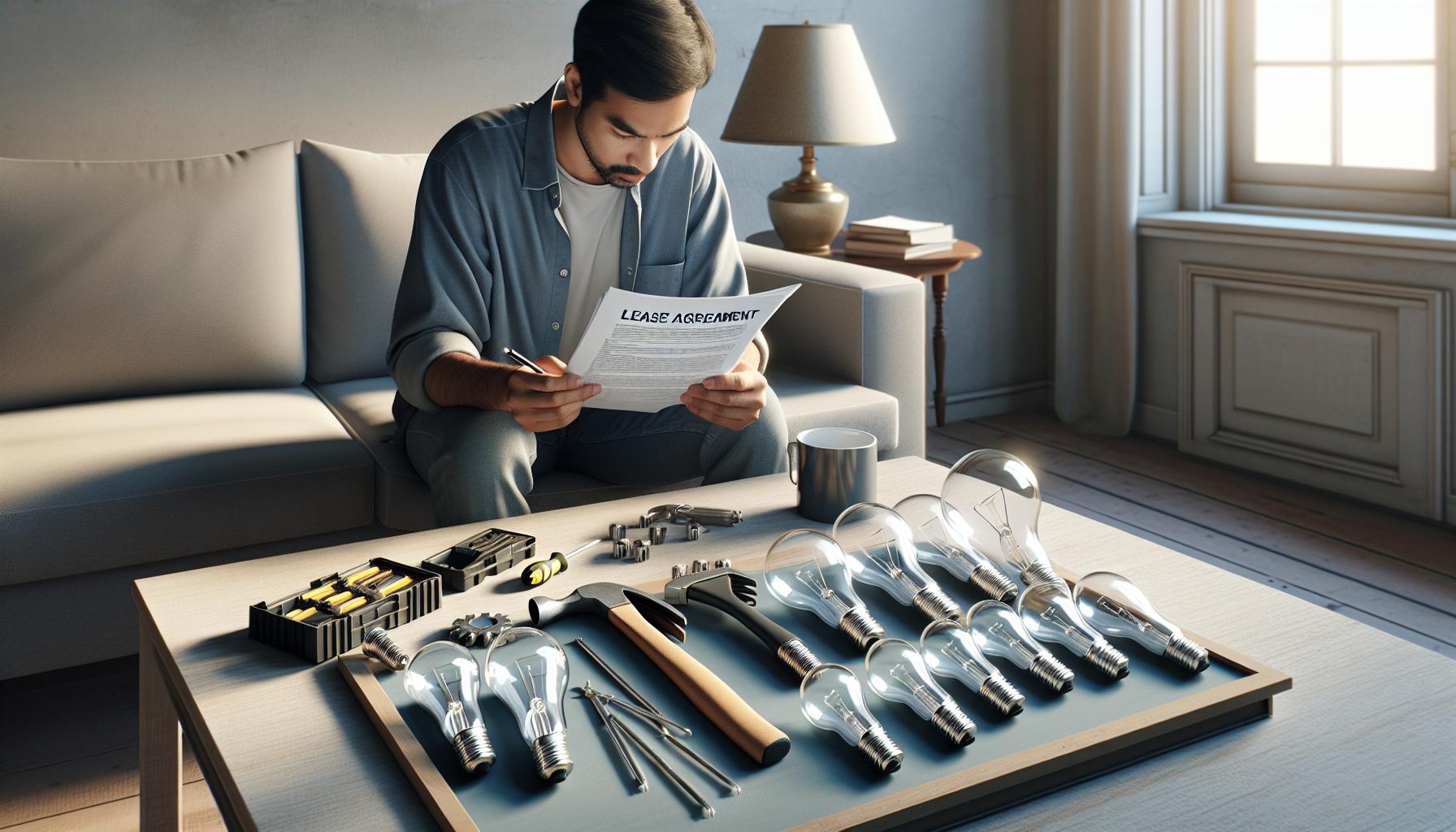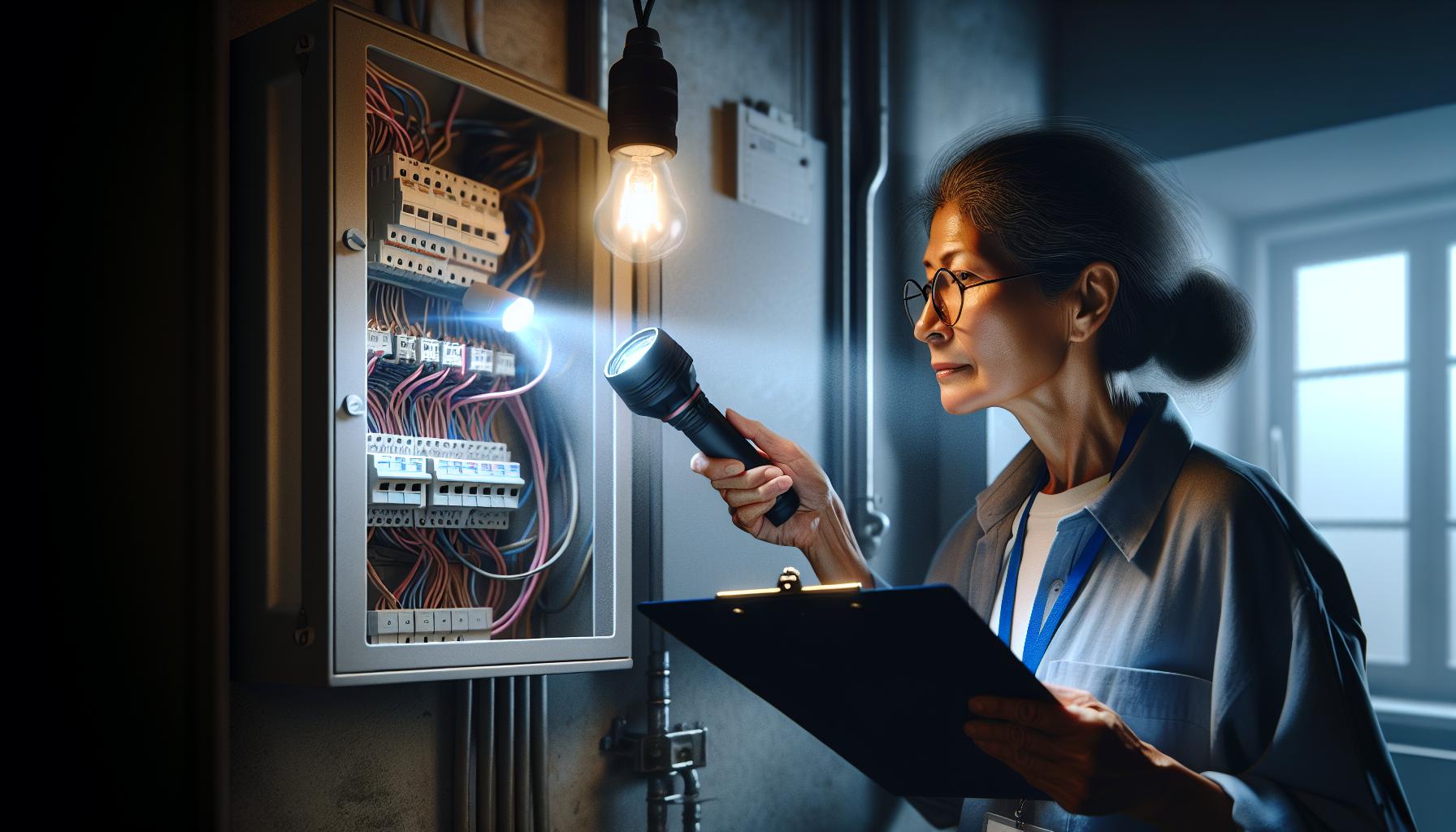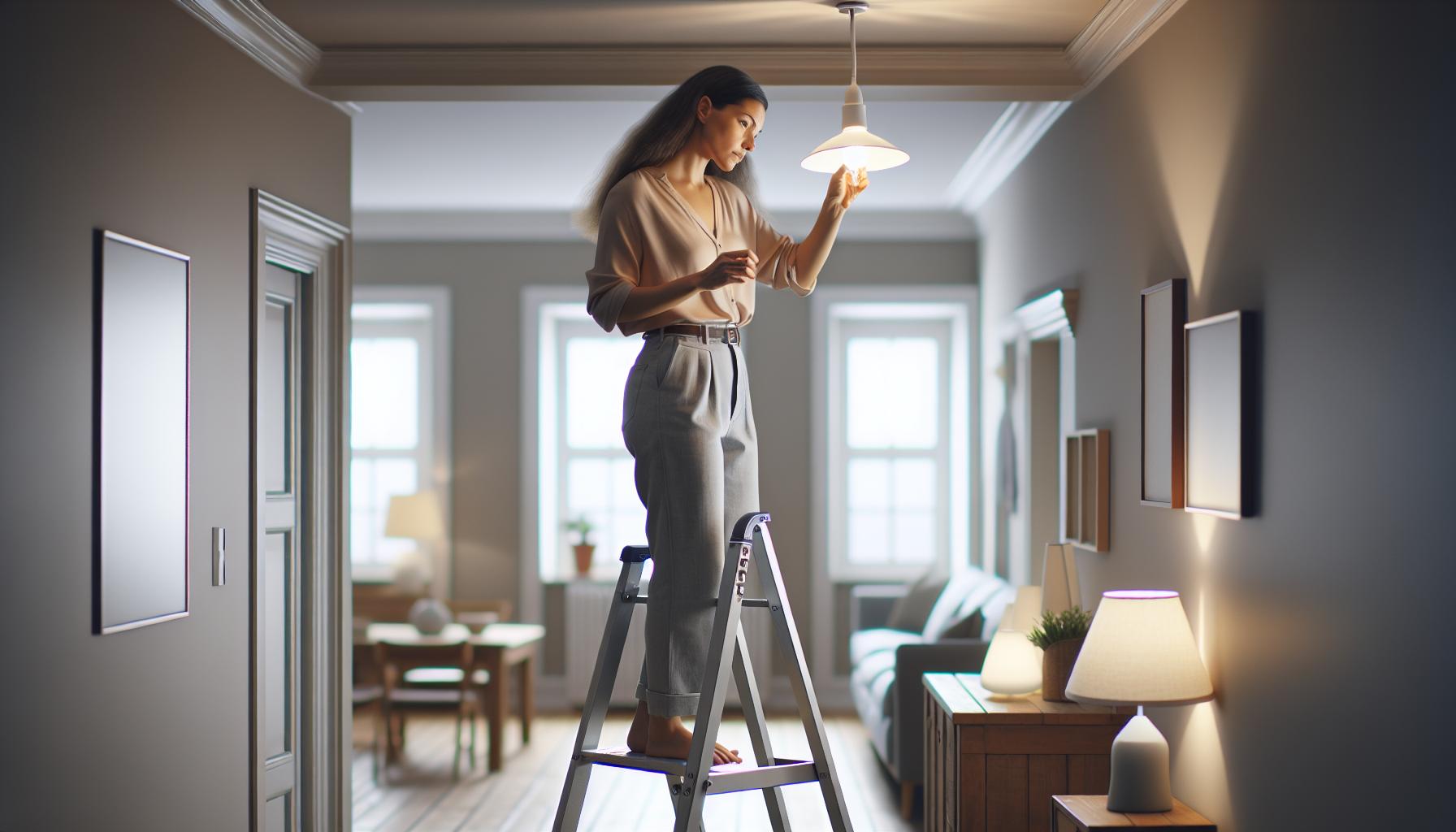Ever found yourself in the dark, literally, wondering who’s supposed to replace that flickered-out light bulb in your rental? It’s a common question that pops up the moment you’re left squinting in the dim hallway. You might think it’s a simple fix, but the answer isn’t always as clear as the light from a brand new bulb.

Navigating the responsibilities of tenancy can feel like walking through a maze without a map. Light bulbs, those everyday essentials we often take for granted, become the subject of debate when you’re renting. Let’s shed some light on the topic and find out if it’s you or your landlord who should be climbing the ladder to keep things bright and shiny.
Who is responsible for maintaining light bulbs in a rental property?
When you first move into a rental property, everything is bright and functioning. But as time passes, you’ll encounter the inevitable need to replace a flickering or burnt-out light bulb. This raises the important question: who’s on the hook for maintaining these luminous details?
First, check your lease. This binding document often contains the specifics of your responsibilities as a tenant. Typically, minor maintenance, like changing light bulbs, should fall within your realm as part of keeping the rented space in good working order. It’s like changing the batteries in your remote; if you enjoy the convenience, you’ll want to keep it up and running.
However, there are instances where the responsibility might shift. If you’re living in a rental property with hard-to-reach light fixtures or specialized lighting systems, your landlord might be responsible for their maintenance. High ceilings or complex chandeliers aren’t just a matter of screwing in a new bulb; these scenarios may require professional handling for safety and functionality.
- For standard bulbs, tenants usually handle the replacement.
- Lease agreements may outline specific cases where the landlord is responsible.
DIY enthusiasts might revel in the opportunity to pick out new bulbs as this also allows you to select the energy efficiency and light quality of your living space. With LED bulbs offering longer lifespans and cost savings, you’ll not only be maintaining but improving the property during your stay.
Remember that light maintenance is more than an obligation; it’s a chance to enhance your rental home. Embracing this task can certainly make your space brighter, both literally and figuratively. Don’t be left in the dark because you weren’t sure of your responsibilities—dive into your lease and keep those lights shining bright.
Understanding the terms of your lease agreement

When you’re knee-deep in various home DIY projects, light bulbs might seem like a small detail, but they’re crucial to creating the right ambiance. Your lease agreement is like the instruction manual for your rental property—it outlines what you’re responsible for. And yes, this often includes light bulb maintenance.
First off, always read your lease carefully. Look for a section specifically outlining maintenance responsibilities. Don’t make assumptions; if it’s not written down, it’s up for interpretation. Here’s a tip: snap a picture of the maintenance clause with your phone so you’ll always have it to reference back to without digging through your documents.
Tenants are typically on the hook for things like:
- Replacing light bulbs
- Smoke detector batteries
- Air filters
But don’t overlook the fine print. Some leases may include exceptions for certain types of light fixtures. For instance, if you’ve got a chandelier hanging 20 feet above your staircase, that might be the landlord’s job to maintain—after all, you’d need special equipment to reach it safely.
Remember that not all light bulbs are created equal. If you’re going for an energy-efficient route, double-check whether these choices are in your lane. Some landlords may require you to stick to the types and brands of light bulbs originally fitted in the property.
Keep an open line of communication with your landlord. If you’re unsure about a particular clause related to lighting or maintenance, simply ask. It’s better to clarify than to guess and possibly err. Plus, maintaining good tenant-landlord relations can make your stay more enjoyable and headaches, around things like light bulb responsibility, fewer.
When in doubt, always revert to the lease agreement. It’s not just about avoiding confrontation; it’s about respecting the property and the terms you’ve agreed to. After all, you might be a DIY enthusiast ready to tackle your world one light bulb at a time, but it’s best to play by the rules of your lease agreement.
Landlord’s obligations regarding maintenance
« Are Oven Light Bulbs Universal? Decoding the Compatibility Mystery
What Are Halogen Light Bulbs? Discover Their Bright Benefits & Savings »

When diving into the nitty-gritty of rental property maintenance, it’s crucial to shine a light on what’s expected from the landlord. Generally, they’re responsible for ensuring that the rental unit is habitable and meets safety standards. Landlord obligations could vary from place to place, but there are some common elements that you can expect them to take care of.
First up, landlords are typically in charge of structural repairs. This includes roofing, exterior walls, and windows – essentially, the framework that holds your home together. This is where your DIY skills won’t be needed; it’s up to the landlord to keep the structure sound. So, if a faulty light fixture is causing lighting issues or poses a hazard, you’d likely not be reaching for your toolbox – that’s on them.
Next, think bigger than just the bulb – electrical systems are another domain of the landlord. These systems must be kept in operable condition for your safety and functionality of your home. If your lighting woes are caused by wiring problems or a malfunctioning electrical panel, your landlord should step in with a solution.
Beyond immediate fixes, landlords should also be proactive with regular maintenance checks. They might periodically inspect smoke detectors, heating systems, and yes, even lighting fixtures, to address any potential issues before they burn out.
It’s important to check your lease for specifics because sometimes landlords may include clauses that transfer some maintenance responsibilities to you. But if you ever find yourself in the dark, literally or figuratively, about who’s in charge of a certain repair, don’t hesitate to reach out to your landlord.
Remember, while you’re busy picking out the perfect hue for your LED bulbs, it’s your landlord’s job to make sure those fixtures are safe, secure, and properly wired. Keeping these responsibilities bright and clear helps ensure a comfortable and well-lit living space for the duration of your tenancy.
Tenant’s responsibilities for maintaining the rental property

As a tenant, the upkeep of your rental property is not just about comfort but also about fulfilling your lease obligations. Lighting is a fundamental aspect of daily living, and as a DIY enthusiast and lighting aficionado, you know that maintaining proper lighting involves more than flicking a switch. Light bulb maintenance is often considered part of these obligations.
Light Bulb Replacement
Generally, replacing light bulbs in your rental falls on you. It’s a simple yet important task that keeps your home illuminated and welcoming. The steps are usually straightforward:
- Identify the burnt-out bulb.
- Purchase the correct replacement.
- Safely switch the old bulb with the new one.
For specialty lighting or integrated fixtures, which might be more complex, reviewing your lease is critical. Some agreements stipulate that the landlord handles unique or hard-to-reach lights.
Smoke Detector Batteries and Air Filters
To ensure continued safety, it’s typical for a lease agreement to assign the responsibility of changing smoke detector batteries to you. Equally, replacing air filters regularly can improve indoor air quality and prevent damage to the HVAC system.
| Maintenance Task | Tenant’s Responsibility |
|---|---|
| Light Bulb Replacement | Yes |
| Smoke Detector Batteries | Yes |
| Air Filter Replacement | Yes |
Communication Is Key
If you’re ever uncertain about your duties, don’t hesitate to reach out to your landlord. Clear communication helps maintain a good relationship and ensures you’re both on the same page. Besides, it never hurts to double-check your obligations and avoid the inconvenience of a dispute over something as simple as light bulb maintenance.
Always keep a stash of bulbs on hand, matching the types installed in your property, and remember to dispose of used bulbs correctly. While lighting maintenance seems low priority, it upholds the value of the property and contributes to a comfortable living environment. Plus, there’s a certain satisfaction in completing these small DIY tasks that keep your home shining bright.
Factors to consider in determining responsibility for light bulbs

When you’re trying to figure out who’s on the hook for light bulbs in your rental unit, specific factors come into play. Dive into your lease with a highlighter because these details aren’t just about illumination, they’re about being prepared and knowing your responsibilities thoroughly.
Lease Clauses
First and foremost, the lease is your lighting bible. Inside, you should find clauses that detail maintenance responsibilities. Don’t rely on memory or assumptions; make sure you know what you agreed to. If it states “Lessee shall maintain all lighting equipment”, you’ll need to stock up on bulbs.
Type of Lighting Fixtures
Also, consider the type of lighting fixtures installed. Are we talking about straightforward lamp bulbs that you can easily unscrew? Or are they specialty bulbs in high ceilings or with intricate designs? In cases where changing a bulb requires a professional or specialized equipment, the responsibility might shift to your landlord.
Reason for Replacement
What’s the reason for the bulb’s untimely demise? If it’s just the bulb’s natural end-of-life, that’s typically in your court. However, if an electrical issue within the property is causing bulbs to blow, it’s time to get the landlord involved.
State and Local Laws
Lastly, don’t forget to brush up on state and local laws. Some places have specific regulations about rental properties and maintenance responsibilities, making these not just suggestions but legal obligations for either party.
- Review your lease agreement
- Assess the complexity of lighting installations
- Determine the cause of bulb failure
- Understand legal requirements in your area
Remember, when you’re in the dark about the rules, you risk missing out on critical details that could save you time, money, and hassle. Knowledge is as essential as the very light bulbs we’re discussing – so get informed and stay enlightened.
Conclusion
You’ve got the scoop on your lighting responsibilities as a tenant. Remember, it’s all about the details in your lease and staying on top of your local laws. Keep that lease agreement handy and don’t hesitate to reach out to your landlord if you’re ever in doubt. Knowing your responsibilities means you’ll keep your home bright and avoid any potential disputes down the line. Stay informed and you’ll navigate the world of rental lighting like a pro!
Frequently Asked Questions
Who is responsible for replacing light bulbs in a rental property?
Generally, tenants are responsible for replacing light bulbs in their rented space. However, it’s crucial to check the lease agreement for specific details since landlords may include this responsibility within the lease.
Should tenants consult their lease agreement regarding light maintenance?
Yes, tenants should review their lease agreement to understand their responsibilities about light maintenance, as it varies by agreement and may not be the same in every rental situation.
Are there different rules based on the type of lighting fixtures?
The type of lighting fixtures may influence maintenance responsibilities. Lease agreements might specify different rules for simple light bulbs versus more complex fixtures or integrated lighting systems.
What if the light bulb replacement is needed due to fixture malfunction?
If a lighting fixture malfunctions through no fault of the tenant, it’s typically the landlord’s responsibility to repair or replace it. Tenants should report such issues to their landlords promptly.
Where can tenants find information about state and local laws on maintenance responsibilities?
Tenants can look up housing codes and regulations on their state or local government websites, or seek guidance from a local tenant’s association, housing authority, or legal aid services for information on maintenance responsibilities.




